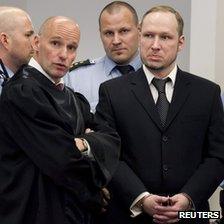Breivik 'hoped attacks would kill hundreds'
- Published

Breivik (r) devoted a "sabbatical" year to an online role-play game
Norway's confessed mass killer Anders Behring Breivik says he intended hundreds should die in his attack on a Labour Party camp last year.
Breivik, 33, told his trial he planned to behead former Prime Minister Gro Harlem Brundtland during the rampage, and post a video of it on the internet.
He also hoped his car bomb in Oslo would kill the entire government.
The attacks killed 77 people. Breivik, 33, disputes a report by a psychiatrist describing him as insane.
He also told the court he used computer games to prepare himself.
Arriving in court on day four of his trial, Breivik made no far-right salute, unlike previous days. His lawyers had asked him not to salute.
He says he acted to protect Norway and Europe from multiculturalism.
The BBC's Steve Rosenberg, at the trial in Oslo, says Breivik was behaving differently from his irritable performance on Wednesday: he was answering most of the questions put to him and seems calm.
'Weapon of mass destruction'
Breivik's waking thought on the day of the attacks - 22 July 2011 - was "today is the day I will die", he told the court in testimony setting out details of his plans and preparation.
First he set off a car bomb outside a government building in Oslo, killing eight people; he claimed he had intended to kill the entire government.
He had apparently wanted to instigate three such bombings, but settled for one when he discovered how difficult it was to make the bombs.
Instead he made his way to Utoeya island and shot dead 69 people - many of them teenagers - at a summer camp being held there.
Breivik claimed he had wanted to kill all 600 or so people on the island, using the surrounding lake as a "weapon of mass destruction" in which they would drown.
His main target had been Mrs Brundtland, whom he planned to capture and behead - and post a video of this on the internet; Breivik said he had got the idea from al-Qaeda.
However the former prime minister had left the island before Breivik arrived.
"I stand for Utoeya and what I did, and would still do it again," he said - as survivors and victims' relatives cried quietly, shaking their heads in disgust at some of the harshest words Breivik has uttered in the trial, AFP news agency reported.
However he insisted he was not a "child murderer".
"I believe that all political activists who choose to fight for multiculturalism are legitimate targets. And 44 out of the 69 people [killed on the island] had leadership positions," he told the court.
"Does this also apply to the 14- and 15-year-olds?" the prosecution asked.
"It is not desirable to focus on people under the age of 18 but there was no other desirable political target on that day," Breivik replied.
Asked what it was like to carry out such a rampage, Breivik responded that it was an "extremely difficult" thing to do. "It goes against human nature in many ways," he said.
'Sabbatical'
Breivik has admitted the killings but denies criminal responsibility, saying he acted to protect Norway and Europe from multiculturalism.
"Militant nationalists in Europe are divided," he told the court on Thursday.
"Half of them think we should attack Muslims and minorities, the other half that we should attack elites, those responsible, and hold them accountable."
In other points, Breivik said:
he was 15 when he became sceptical of Muslim immigration, and 18 or 19 when he first thought about committing violence
he named his manifesto 2083 to represent the 400th anniversary of the Battle of Vienna, when the Ottoman Turks were defeated
he named the guns he used in the Utoeya shootings after characters in Norse mythology
he joined the Masons as soon as he was old enough because they were a "Christian organisation that protects its members"
he took a year's "sabbatical" from business activities in 2006 because he was planning a "suicide action"
he spent the year playing the online role-play game, World of Warcraft, for up to 16 hours a day.
The court heard that Breivik formed a company in the Bahamas as a front for money-laundering funds intended for nationalist activities.
The court is seeking to determine whether Breivik is sane. If so, he will be jailed for at least 21 years, although that sentence can be extended.
If he is deemed insane, he will be committed to a psychiatric institution.
Breivik's evidence is scheduled to last five days, concluding on Monday. The entire proceedings are expected to last 10 weeks.